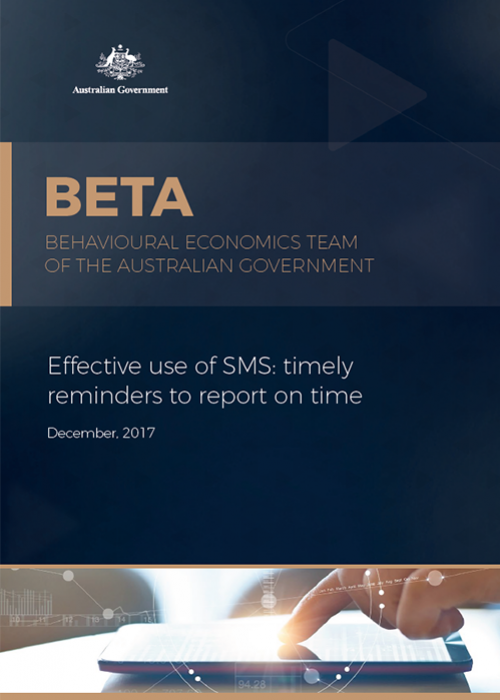Many income support recipients report their income late, which results in delayed, and sometimes even cancelled, payments. This can lead to financial gaps for these Australians and their families.
BETA joined forces with the Australian Government Department of Human Services to help job seekers report on time to receive their income support payments on time.
Drawing on behavioural insights, we designed six versions of an SMS reminder and ran a trial to test if they would improve people’s reporting behaviour.
The findings of our trial are clear: small, simple communication changes make a big difference. We found sending any SMS reminder increased the number of people who reported on time and reduced the number of payment cancellations.
Authors: Professor Michael J. Hiscox, Scott Copley, Jacqui Brewer, Andrei Turenko, and James Wilson.
Pre-registration information
The aim of the study is to examine whether providing targeted, timely and behaviourally informed prompts about reporting income, via SMS, improves the number of recipients who report on time.
Customers in receipt of Newstart Allowance and Youth Allowance Jobseeker payments administered by the Department of Human Services (DHS) are required to report fortnightly any income they receive from employment. Such reporting ensures recipients receive the correct payment. Late reporters may have their payments cancelled. This can be problematic for the recipient and can increase departmental work resulting from effort required to reinstate recipients back onto payments and increased customer contact.
This trial will have seven arms and will scientifically test behaviour against some key behavioural concepts such as personalisation and loss and gain framed messages.
It is anticipated findings from this research will inform service delivery both within the lead department and across the Australian Public Service.
ADDITIONAL TRIAL INFORMATION
Intervention start and end date: Monday, 01 May 2017 to Thursday, 04 May 2017
BETA ethics pre-registration number: BETA ETH 2017 - 007
Experimental design: 7-arm Randomised Controlled Trial.
This trial will test differently framed text messages, over several days of one week, to assess whether this communication improves on-time reporting by recipients who have reported late in the fortnight before trial commencement.
- Customer correspondence standard (loss framed message) with a consequence for late reporting
- Personalised customer correspondence standard (loss framed message) with a consequence for late reporting
- Short simple message without a consequence
- Personalised short simple message without a consequence.
- Gain framed message (details positive consequence of on-time reporting)
- Personalised gain framed message (details positive consequence of on-time reporting)
- No-treatment control group
Intervention(s): SMS communication from DHS to prompt recipients who are due to complete their fortnightly reports the next day
Control condition: Treatment as usual
Outcome(s):
Primary: Number of recipients who report on time in each condition.
Secondary:
- Median number of days to report.
- % of recipients who are cancelled from payment due to reports >13 days late.
- Subgroup analyses of characteristics of late reporters for whom the behavioural interventions are effective.
Expected sample size: Approximately 10,000 across the 6 active interventions, plus control
Other:
Hiscox, Michael. 2017. Effective use of SMS to encourage timely reporting behaviour using digital channels. AEA RCT Registry. May 10.


